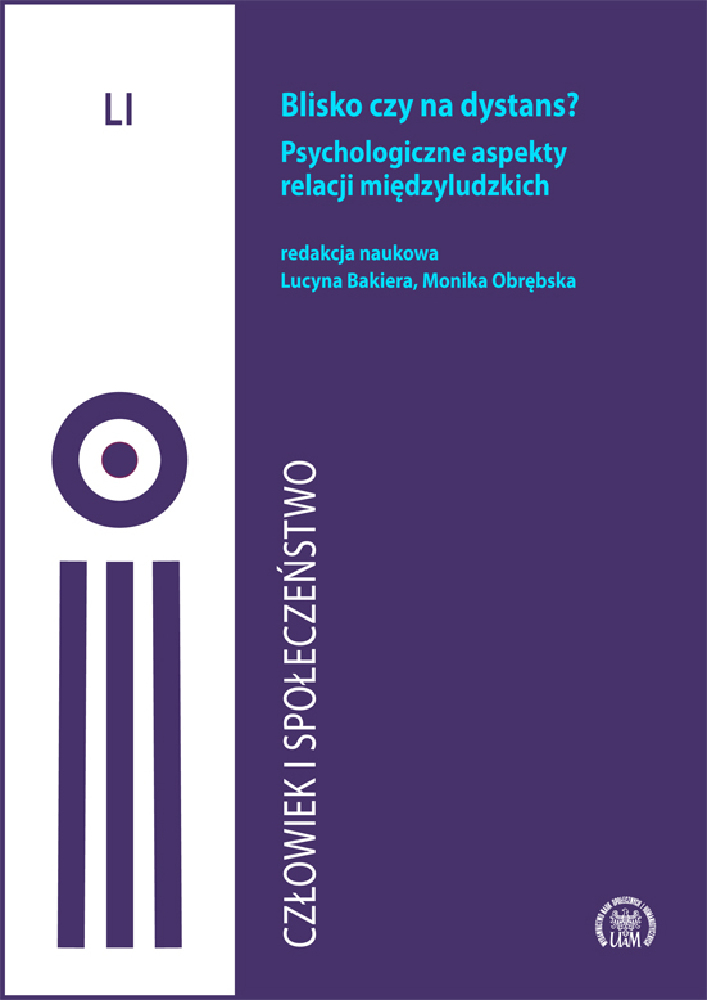Abstract
The aim of the present study was to examine the relationship between styles of sense of humour and parental attitude. The study sample consisted of adults who are parents, mostly women (59 vs 14 men). Because the study was exploratory in nature, a statistical significance level of α < .10 was adopted and tentatively demonstrated the existence of partial relationships between the constructs analyzed. Level of self-deprecating humour correlates with intensity of demanding attitude (rho = .249, p = .035) and intensity of demanding attitude (rho = .241, p = .042). In contrast, the level of aggressive humor correlates negatively with accepting attitude (rho = –.273, p = .012) but correlates positively with inconsistent attitude intensity (rho = .217, p = .067).
References
Bowen, M. (1978). Family Therapy in Clinical Practice. New York: Jason Aronson.
Charytonik, J. (2009). Temperamentalne uwarunkowania stylów poczucia humoru i ich związek z radzeniem sobie ze stresem. Niepublikowana praca magisterska. Warszawa: SWPS.
Field, D. (2008). Osobowości rodzinne. Warszawa: Oficyna Wydawnicza Logos.
Gulla, B., Tucholska, K. (2007). Psychologia pozytywna: cele naukowo-badawcze i aplikacyjne oraz sposób ich realizacji. Studia z Psychologii w KUL, 14, 133–152.
Hornowska, E., Charytonik, J. (2011). Polska adaptacja kwestionariusza stylów humoru (HSQ) R. Martina, P. Puhlik-Doris, G. Larsena, J. Gray i K. Weir. Studia Psychologiczne, 49(4), 5–22.
Kirsh, G.A., Kuiper, N.A. (2003). Positive and negative aspects of sense of humor: Associations with the constructs of individualism and relatedness. Humor, 16(1), 33–62.
Krok, D. (2010). Systemowe ujęcie rodziny w badaniach dobrostanu psychicznego jej członków. W: D. Krok, P. Landwójtowicz (red.), Rodzina w nurcie współczesnych przemian. Studia interdyscyplinarne (ss. 359–368). Opole: Redakcja Wydawnictw WT Uniwersytetu Opolskiego.
Kucharski, A. (2009). Struktura i treść jako wyznaczniki komizmu tekstów humorystycznych. Lublin: Wydawnictwo Uniwersytetu Marii Curie-Skłodowskiej.
Kuiper, N.A., Borowicz-Sibenik, M. (2005). A good sense of humor doesn’t always help agency and communion as moderators of psychological wellbeing. Personality and Individual Differences, 38, 365–377.
Martin, R.A., Puhlik-Doris, P., Lersen, G., Gray, J., Weir, K. (2003). Individual differences in uses of humor and their relation to psychological wellbeing: Development of the Humor Styles Questionnaire. Journal of Research in Personality, 37, 48–75.
Plopa, M. (2008). Kwestionariusz Retrospektywnej Oceny Postaw Rodziców (KPR-ROC). Podręcznik. Warszawa: Vizja Press & IT.
Plopa, M. (2011). Psychologia rodziny: teoria i badania. Kraków: Impuls.
Radomska, A. (2002). Rola poczucia humoru w procesie radzenia sobie ze stresem – przegląd badań. W: I. Heszen-Niejodek, J. Mateusiak (red.), Konteksty stresu psychologicznego (ss. 150–166). Katowice: Wydawnictwo Uniwersytetu Śląskiego.
Rembowski, J. (1972). Więzi uczuciowe w rodzinie. Warszawa: Państwowe Wydawnictwo Naukowe.
Rusek, A. (2012). Wielowymiarowość humoru. Innowacje Psychologiczne, 1(1), 117–127.
Rusiak, D. (2014). Postawy rodzicielskie rodziców a kształtowanie się tożsamości osób w okresie wczesnej dorosłości. Młoda Psychologia, 2, 111–124.
Rynkiewicz, J. (2012). Kognitywne spojrzenie na poczucie humoru. Via Mentis, 1, 85–98.
Ryś, M. (2001). Systemy rodzinne. Metody badań struktury rodziny pochodzenia i rodziny własnej. Warszawa: Centrum Metodyczne Pomocy Psychologiczno-Pedagogicznej.
Strzelczyk, J. (2005). Korelaty temperamentalne poczucia humoru. Niepublikowana praca magisterska. Poznań: Instytut Psychologii UAM.
Szuman, S. (1935/1936). O dowcipie i humorze (szkic psychologiczny), Marchołt. Kwartalnik Poświęcony Sprawom Literatury i Kultury, 2(6), 235–258.
Tomczuk-Wasilewska J. (2009). Psychologia humoru. Lublin: Wydawnictwo KUL.
Tytko, M.M. (2011). Koncepcja humoru i dowcipu w ujęciu Stefana Szumana. Kultura i Wychowanie, 1, 131–143.
Ziemska, M. (1973). Postawy rodzicielskie. Warszawa: Wiedza Powszechna
License
1. W momencie złożenia pracy celem rozpoczęcia postępowania w sprawie publikacji, Licencjodawca, zwany dalej Autorem, akceptuje wszystkie zasady umieszczone na stronie internetowej czasopisma “Człowiek i Społeczeństwo”, udzielając Licencjobiorcy, zwanego dalej Wydawcą, niewyłącznej i nieodpłatnej licencji na korzystanie z Utworu. Licencja zakłada tym samym brak ograniczeń terytorialnych, czasowych oraz ilościowych na następujących polach eksploatacji (art. 50 ustawy z dnia 4 lutego 1994 r. o prawie autorskim i prawach pokrewnych):
a. utrwalanie Utworu;
b. zwielokrotnienie Utworu drukiem i w wersji cyfrowej;
c. wprowadzenie do obrotu, użyczenie lub najem oryginału/zwielokrotnionych egzemplarzy Utworu;
d. publiczne wykonanie, wystawienie, wyświetlenie, odtworzenie oraz nadawanie i reemitowanie, a także publiczne udostępnianie Utworu w taki sposób, aby każdy mógł mieć do niego dostęp w miejscu i w czasie przez siebie wybranym;
e. włączenie Utworu w skład utworu zbiorowego;
f. wprowadzenie Utworu w postaci elektronicznej na platformy elektroniczne lub inne wprowadzenie Utworu w postaci elektronicznej do Internetu, Intranetu, Extranetu lub innej sieci;
g. rozpowszechnianie Utworu w wersji elektronicznej w Internecie, Intranecie, Extranecie lub innej sieci, w pracy zbiorowej, a także samodzielnie w formule Open Access w oparciu o licencję Creative Commons Uznanie autorstwa 4.0 Międzynarodowa Licencja Publiczna (CC BY 4.0), a także inną wersję językową tej licencji, lub którąkolwiek późniejszą wersję tej licencji.
2. Założenia licencji Creative Commons Uznanie autorstwa 4.0 Międzynarodowa Licencja Publiczna (CC BY 4.0), udzielają Wydawcy upoważnienia do kopiowania, zmieniania, rozprowadzania, przedstawiania i wykonywania Utworu jedynie pod warunkiem uznania autorstwa.
3. Wraz z dostarczeniem Utworu, Autor zobowiązuje się do wypełnienia, podpisania oraz odesłania skanu umowy

